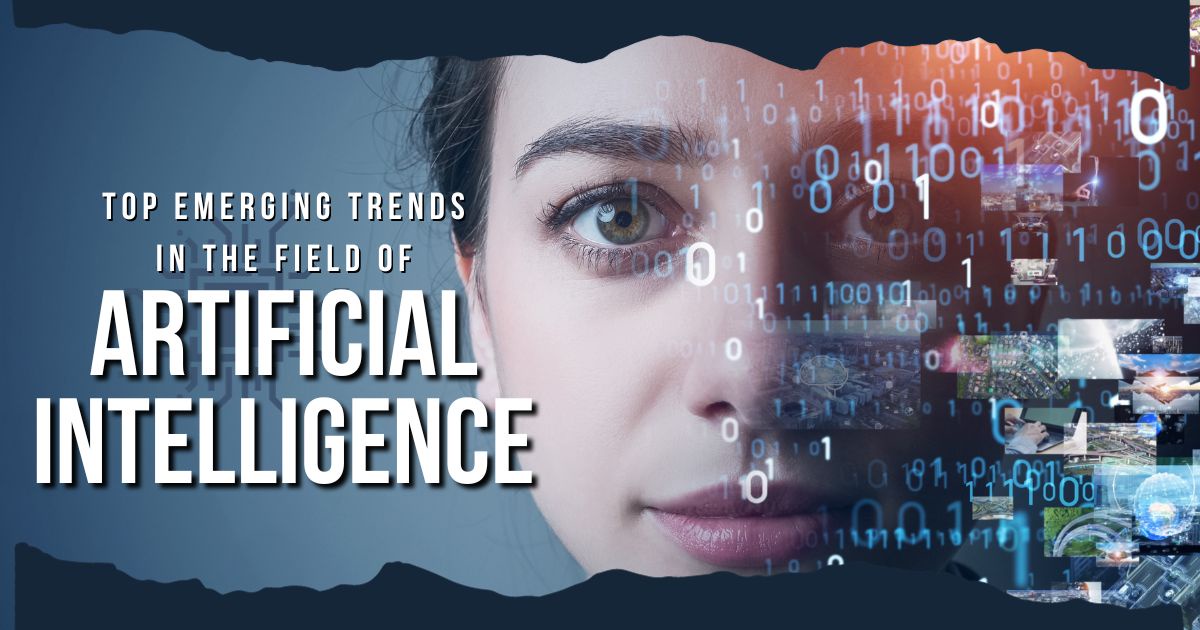Artificial intelligence (AI) is developing quickly, and its influence across several sectors is apparent. This article explores the top emerging trends in the field of artificial intelligence that are shaping the future.
1. Explainable AI (XAI)
As AI models become more complex, it can take time to understand how they arrive at specific decisions. Explainable AI (XAI) addresses this issue by making AI algorithms more transparent and interpretable. It provides insights into why a particular decision was made, which is crucial for applications in healthcare, finance, and critical decision-making where transparency is essential.
2. AI in Healthcare
Artificial intelligence is revolutionizing the healthcare industry. AI is used for diagnosing diseases from medical images like X-rays and MRIs, drug discovery, and developing personalized treatment plans based on a patient's genetic profile. AI improves patient care, reduces medical errors, and lowers healthcare costs.
3. Edge AI
Edge AI combines edge computing with artificial intelligence. It enables data processing and AI model execution at or near the data source, reducing latency and enhancing real-time decision-making. This trend is particularly valuable in applications like autonomous vehicles, where split-second decisions are critical.
4. AI in Cybersecurity
With the increasing number and complexity of cyber threats, AI plays a pivotal role in enhancing cybersecurity. Real-time threat detection and response capabilities of AI-driven security systems make them a proactive deterrent against cyberattacks.
Also Read: Role Of Generative AI In Cybersecurity
5. Generative Adversarial Networks (GANs)
GANs are a type of AI model that is widely used for creating data, such as images, videos, and audio. They consist of two neural networks, one that generates data and another that evaluates it. GANs have applications in image synthesis, video generation, and even deepfake detection.
6. AI Ethics and Bias Mitigation
The widespread use of AI brings ethical concerns and challenges related to bias in AI algorithms. Organizations are now focusing on ethical AI development and are actively working to identify and mitigate bias in AI systems. Fairness and openness are of utmost importance.
7. Quantum Computing and AI
Quantum computing has the potential to revolutionize AI. Quantum computers can perform complex calculations at speeds impossible for classical computers. This development can accelerate AI research, leading to optimization problems, cryptography, and drug discovery breakthroughs.
8. AI in Agriculture
AI is reshaping agriculture through precision farming. It optimizes crop management, predicts crop yields, and minimizes resource usage. Sensors and AI algorithms help farmers make data-driven decisions for increased productivity and sustainability.
9. AI-Powered Chatbots and Virtual Assistants
AI-driven chatbots and virtual assistants are transforming customer service and engagement across industries. They provide quick, efficient responses to customer inquiries, assist with tasks, and improve user experiences on websites and mobile apps.
10. AI in Education
Educational technologies with AI capabilities provide pupils with individualized learning opportunities. These tools adapt to individual learning styles, provide instant feedback, and offer insights into student performance. AI in education enhances the quality of education and helps students achieve better outcomes.
Conclusion
Artificial intelligence is at the forefront of technological advancements, and these emerging trends are set to reshape industries and society. Staying informed and adapting to these trends is crucial for businesses and individuals to harness the full potential of AI.
Unique FAQs on Artificial Intelligence
Q. What is the significance of XAI in AI development?
A: Explainable AI (XAI) is essential for building trust in AI systems, allowing users to understand and verify the decisions made by AI algorithms.
Q. How is AI being used in cybersecurity?
A: AI in cybersecurity helps detect anomalies, identify threats, and respond in real-time to protect sensitive data and systems.
Q: What are the potential applications of Edge AI?
A: Edge AI is used in autonomous vehicles, IoT devices, and industrial automation, enabling real-time data analysis at the source.
Q: How is AI addressing bias and ethical concerns in its applications?
A: Organizations are implementing ethical AI practices, including bias mitigation techniques and fairness audits of AI models.
Q: What role will quantum computing play in the future of AI?
A: Quantum computing will enable AI models to perform complex tasks at unparalleled speeds, driving advancements in AI research and applications.


No comments yet